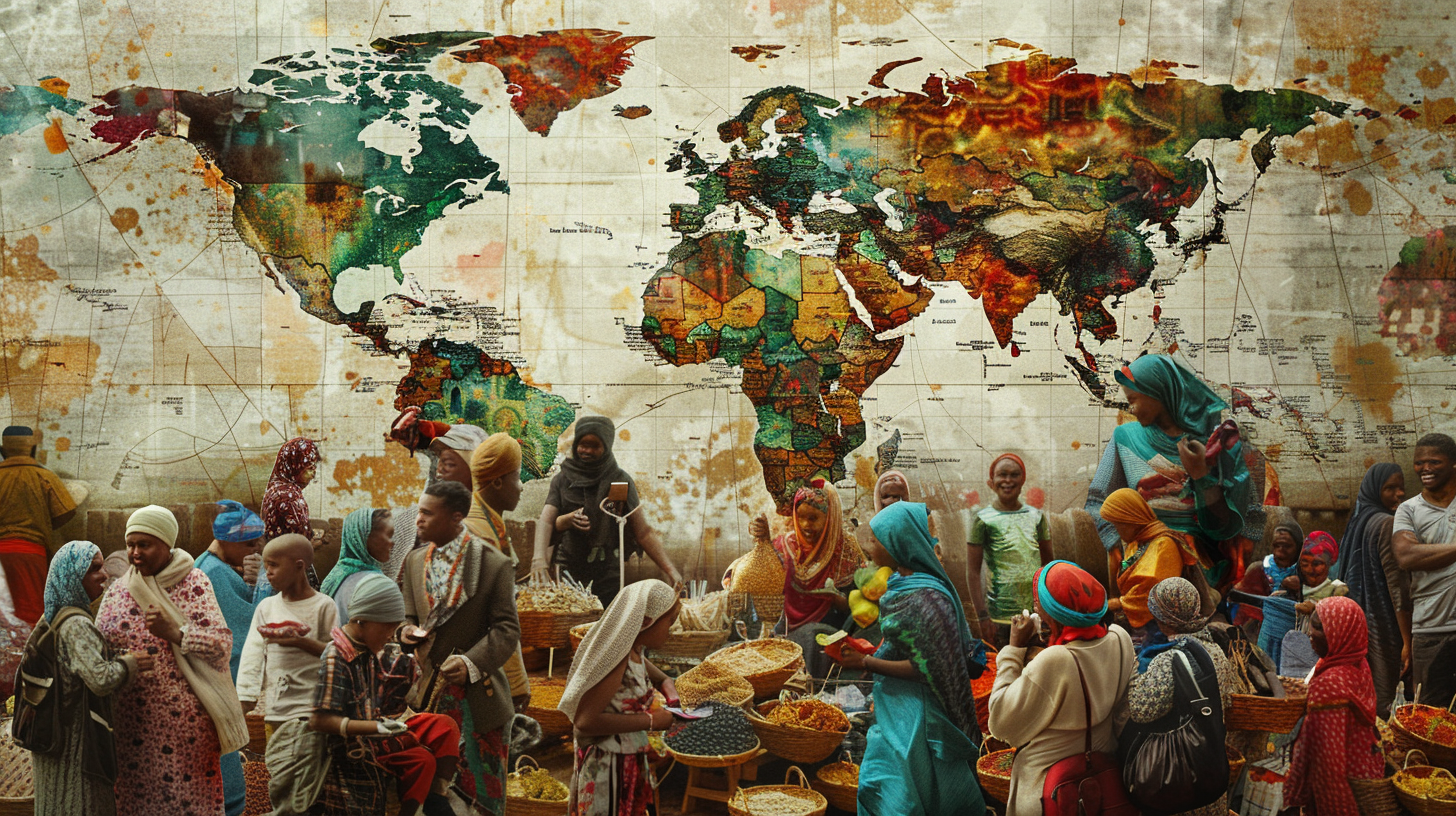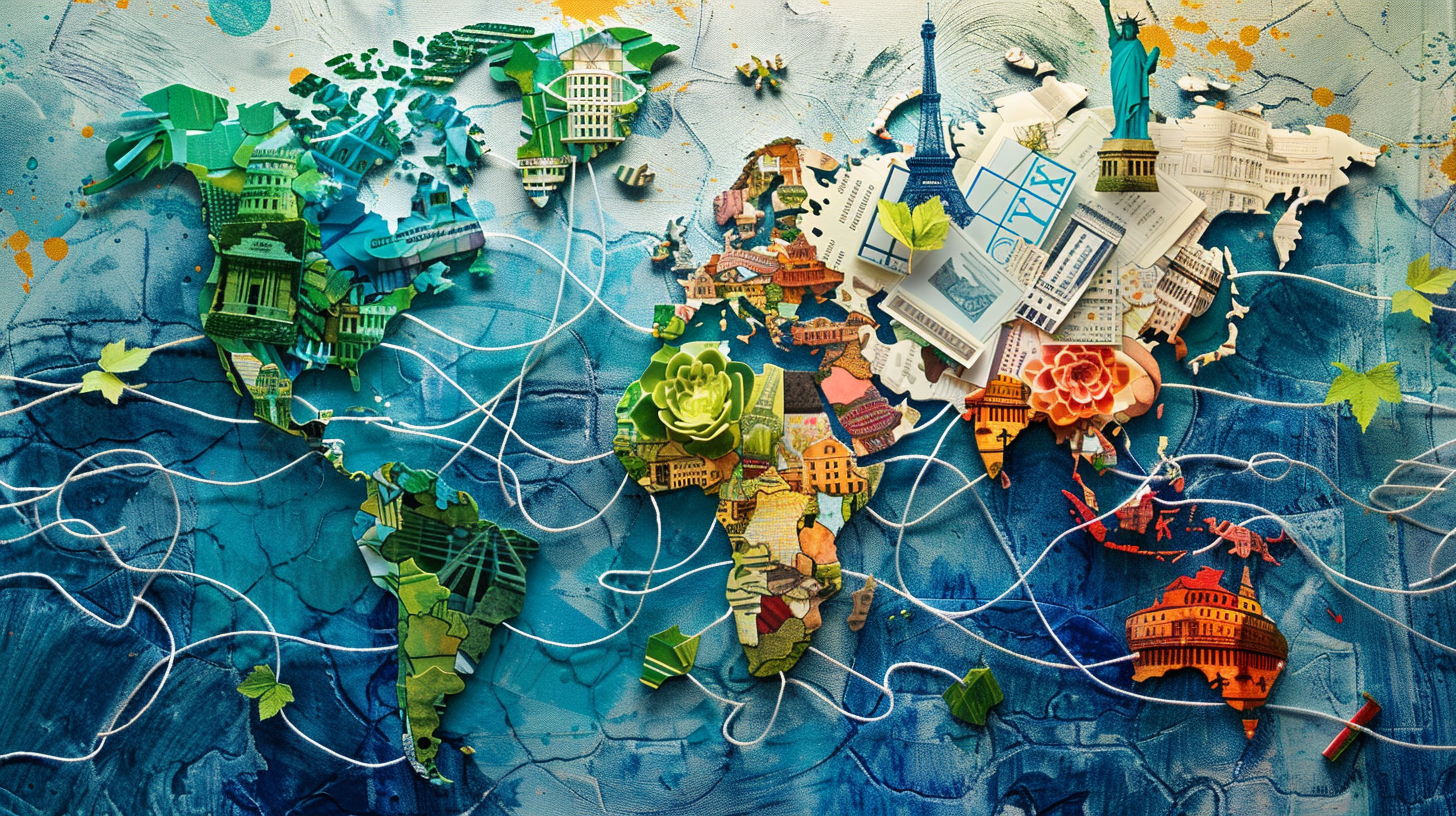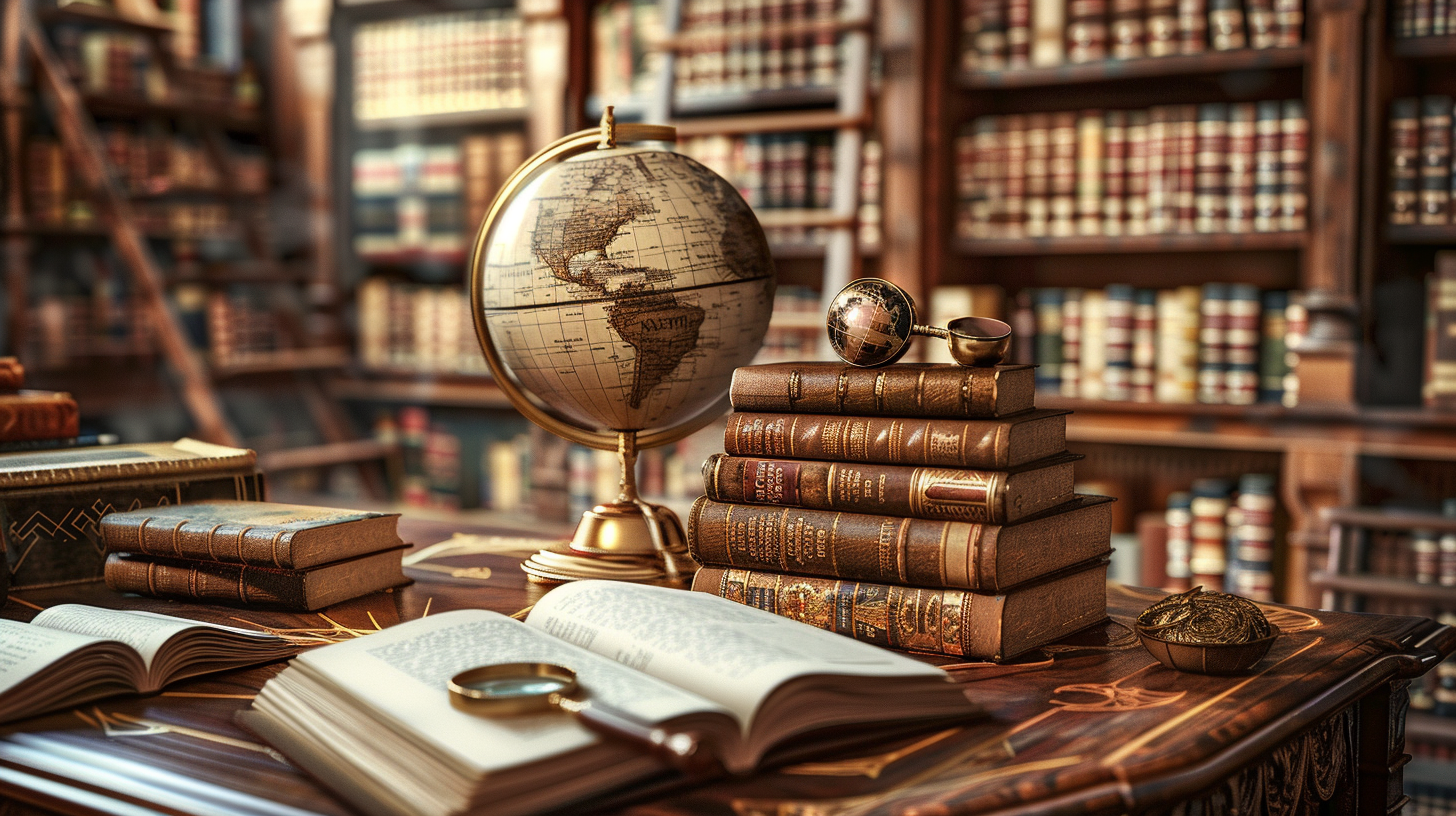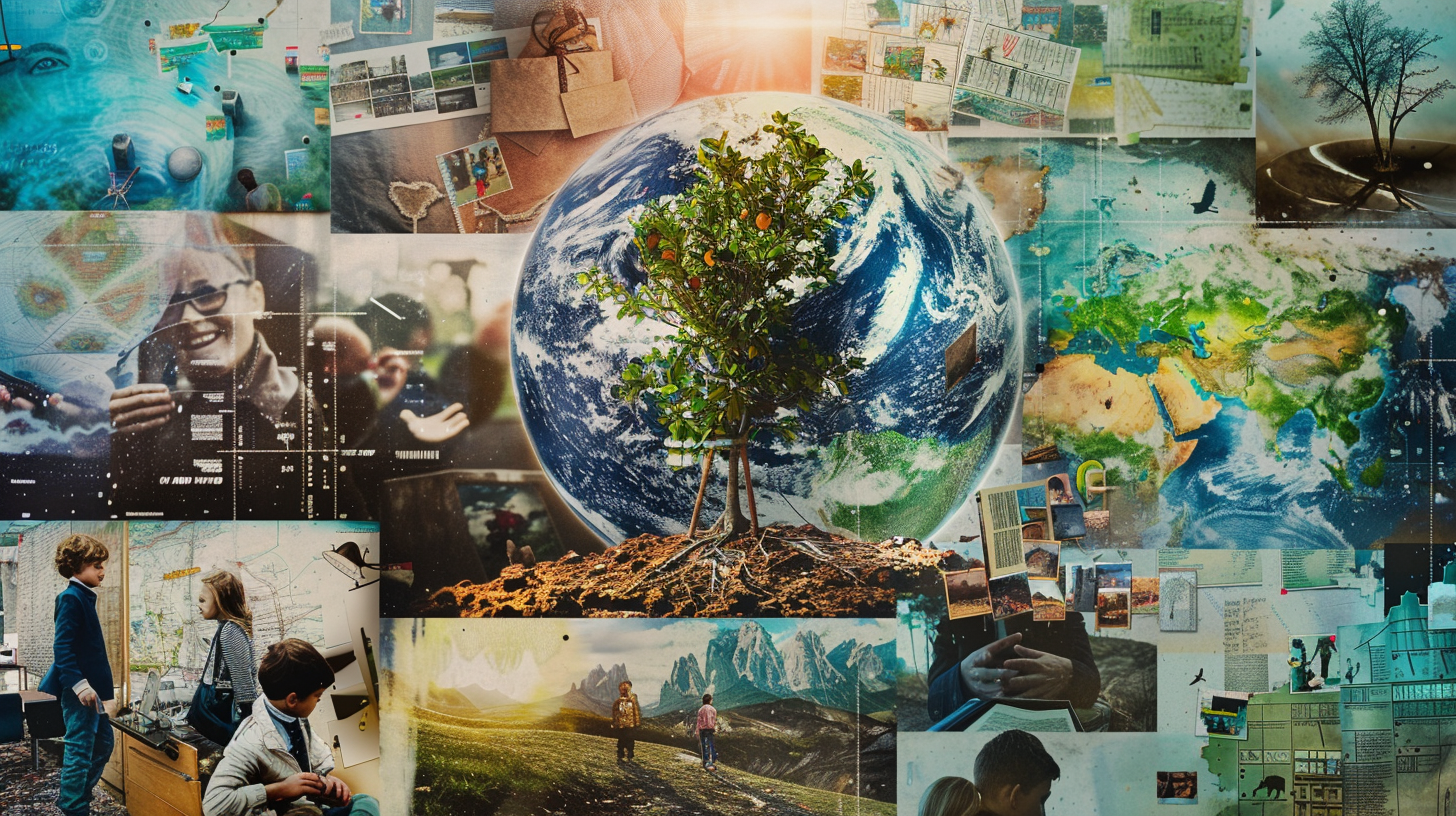Introduction

In today’s world, over 50% of global trade hinges on intricate supply chains that span multiple continents, illustrating just how interconnected and interdependent our global society has become. This startling statistic not only highlights the economic dimension of interconnectedness but also sets the stage for a deeper exploration of its pervasive influence on our cultural, political, and environmental landscapes.
Global interconnectedness transcends mere economic transactions; it is a comprehensive web that binds diverse cultures, political movements, and environmental challenges into a unified global narrative. In recent times, this interconnectedness has become not just a fact of life but a vital lens through which to view the world, especially as global events—from pandemics to political upheavals—demonstrate the profound impact of our interconnected world on individual lives.
This article is designed to deepen your understanding of this complex topic. We have meticulously curated a list of influential books that not only elucidate the many facets of global interconnectedness but also aim to inspire you to weave these insights into your personal and professional lives. Whether you’re a student seeking academic enrichment, a professional aiming to leverage global trends, or simply a curious mind aspiring to grasp the nuances of our interconnected world, these books promise to transform your perspective and foster a greater appreciation for the global tapestry that shapes our lives.
As we dig into this exploration, let the journey through these pages be both enlightening and inspiring, urging you to reflect on how deeply connected we truly are and the powerful impact we can have when we act with a global consciousness.
Understanding Global Interconnectedness

Global interconnectedness, a concept at once complex and compelling, describes the deep and multifaceted connections that span our modern world, weaving together its cultural, economic, political, and environmental threads into a vibrant global tapestry. This interconnectedness means that actions and events in one part of the world can have profound implications across the globe, from shifting economic tides to merging cultural horizons.
Historically, global interconnectedness has roots that stretch back centuries but has dramatically accelerated in recent decades. The Silk Road, an ancient network of trade routes, exemplifies early economic and cultural interconnectedness, facilitating not only the exchange of goods like silk and spices but also the sharing of ideas and technologies between the East and West. The Industrial Revolution further catalyzed this connectivity, with advancements in transportation and communication shrinking the vast distances that once separated nations and peoples. In the 20th century, the rise of the internet transformed global interconnectedness from a primarily physical phenomenon to a digital and instantaneous one, enabling people to communicate and collaborate across continents in real-time.
In today’s world, the relevance of global interconnectedness has never been more evident. Recent global events, such as the COVID-19 pandemic and international responses to climate change, underscore the necessity of global cooperation and understanding. These crises have shown how health, environmental, and economic challenges do not respect national borders, thus requiring a globally interconnected approach to foster effective solutions. Additionally, globalization’s impact on local economies illustrates both the opportunities and challenges posed by this interconnected world, as businesses and workers adapt to a marketplace where international competition and cooperation are the norms.
Understanding global interconnectedness is crucial not only for grasping these global dynamics but also for making informed decisions that contribute positively to our world. As we explore various books on this subject, you, the reader, are invited to deepen your understanding of how deeply intertwined our lives are with those of others around the planet. These books promise insights into making the most of these connections, enhancing both personal growth and professional success in an increasingly interconnected landscape.
Through this exploration, the aim is to not only inform but also inspire—a call to more fully appreciate and engage with the world’s interconnectedness, fostering a deeper commitment to global stewardship and cooperation.
Unraveling Globalization: A Deep Dive into Our Interconnected World | World101 CFR
Criteria for Selecting the Best Books on Global Interconnectedness

When curating a list of essential reads on global interconnectedness, our selection was guided by stringent criteria designed to ensure that each book offers a rich, comprehensive understanding of this multifaceted topic. Here’s how we chose the best books to help you navigate the complex webs of our interconnected world.
Relevance: Each book on our list tackles the diverse dimensions of global interconnectedness—cultural, economic, political, and environmental. For instance, some books explore the cultural exchanges that occur in our increasingly globalized society, while others delve into economic dependencies and the political ramifications of a world more connected than ever before. Environmental interconnectedness is also a crucial topic, as global climate issues require cooperation beyond borders. These books provide a holistic view, ensuring you grasp the interconnected nature from multiple perspectives.
Authority: The authors of these books are not just writers; they are renowned experts in their fields. They include academics whose life’s work revolves around understanding globalization, practitioners who implement policies and strategies based on these principles, and thought leaders who shape our understanding of what it means to live in an interconnected world. Their authoritative insights ensure that the content is not only accurate but also cutting-edge.
Impact: The impact of a book extends beyond its initial publication. The works we selected have sparked discussions, influenced policy decisions, and been used in educational settings around the world. Many have received accolades and have been cited in countless studies, showcasing their significance in the ongoing conversation about global interconnectedness. Their transformative power in thought and action highlights their importance on our list.
Reader Engagement: We understand that the subject of global interconnectedness can be complex. Therefore, we chose books that are known for their engaging writing style and accessibility to a broad audience. These books break down intricate concepts into understandable segments, making them approachable for readers regardless of their prior knowledge of the subject. This accessibility is vital in educating and engaging a wider audience, thereby spreading awareness and understanding.
By adhering to these criteria, we ensure that the books recommended not only enrich your knowledge but also engage and inspire you to think about the global connections that shape our lives. Each book has been chosen with the intent to provide you with the most thorough and accessible pathway into the world of global interconnectedness, encouraging a deeper appreciation and understanding of this crucial subject.
Top Books on Fostering Global Interconnectedness: A Comprehensive Guide
“The World is Flat” by Thomas L. Friedman
Summary:
Thomas L. Friedman’s seminal work, “The World is Flat,” examines the precipitous changes caused by globalization in the early 21st century, asserting that the world is “flat” due to the leveling of the global competitive playing fields. Friedman explores how technological advancements have dismantled barriers and interconnected the world, enabling countries like India and China to become closer competitors with the Western world.
Relevance:
This book is a cornerstone for understanding how technological evolution and the dissolution of geographical barriers have reshaped global economics. Friedman’s detailed analysis of outsourcing, supply-chaining, and horizontal collaboration introduces readers to the complex mechanisms of global interconnectedness. His exploration of the triple convergence of new players, on a new playing field, with new processes provides a foundational perspective on the economic dimensions of our interconnected world.
Impact:
Since its publication, “The World is Flat” has influenced both policymakers and the general public, sparking debates and discussions about globalization’s benefits and drawbacks. Its reception has been broadly positive, recognized for challenging the perceptions of global economics and encouraging a deeper understanding of the flattening world. The book has become a must-read in numerous academic courses and global studies programs, praised for its forward-looking insights and accessible writing style.
“Globalization and Its Discontents” by Joseph E. Stiglitz
Summary:
Joseph E. Stiglitz’s “Globalization and Its Discontents” provides a critical examination of globalization’s adverse effects, particularly on developing nations. Stiglitz, a Nobel laureate, critiques major global financial institutions like the IMF, World Bank, and WTO, arguing that they often propagate economic policies that disadvantage poorer nations.
Relevance:
The book offers a vital counterpoint to more optimistic views of economic globalization by discussing its role in exacerbating inequality and fostering economic instability. Stiglitz’s insights into how economic policies can fail the very nations they aim to help are crucial for anyone interested in the real-world impacts of global economic policies and interconnectedness.
Impact:
“Globalization and Its Discontents” has resonated widely, influencing both academic and policy-making circles. It has ignited significant debates about the governance of global finance and development strategies, making it an influential work in the study of globalization’s darker sides. The book has also been used extensively as a text in university courses on international economics and development.
“The Big Picture: On the Origins of Life, Meaning, and the Universe Itself” by Sean Carroll
Summary:
In “The Big Picture,” physicist Sean Carroll explores the concept of interconnectedness from a philosophical and scientific viewpoint, questioning how everything in the universe is connected from atoms to galaxies, and how that influences our understanding of life and meaning.
Relevance:
This book extends the discussion of interconnectedness beyond the socio-economic framework to include the existential and cosmological questions that bind human existence to the far reaches of the cosmos. Carroll’s interdisciplinary approach provides a broader context for interconnectedness, examining how scientific principles like entropy and evolution inform our understanding of complexity and connectivity in the universe.
Impact:
Carroll’s work is celebrated for bridging the gap between complex scientific concepts and general comprehension, making it an invaluable resource for readers interested in the intersections of science, philosophy, and global interconnectedness. It has been praised for its thoughtful narrative and ability to make scientific ideas accessible and relevant to everyday life.
Additional Recommendations:
“Factfulness” by Hans Rosling emphasizes understanding the world through a more accurate and data-driven perspective, offering insights into how global development is interconnected.
“The Post-American World” by Fareed Zakaria discusses the rise of countries like China and India in the global order, analyzing the shift in power and its implications for global interconnectedness.
Relevance and Impact:
These books provide additional perspectives on global interconnectedness, discussing its implications from various angles such as data perception, economic shifts, and geopolitical changes. Each contributes uniquely to the discussion, offering fresh insights and broadening the reader’s understanding of what it means to live in an interconnected world.
By exploring into these books, readers are encouraged to explore the intricate tapestry of global interconnectedness from multiple angles, enhancing their understanding and appreciation of the profound connections that shape our world.
Practical Applications of Insights from Books on Global Interconnectedness

In today’s ever-connected world, understanding global interconnectedness is not just about being informed—it’s about evolving as individuals within a global community. The books discussed, like The World is Flat by Thomas L. Friedman, enhance personal understanding and foster a greater awareness of global dynamics. They illuminate how deeply integrated our lives are with those around the world, from the economic exchanges to cultural influences. By grasping these concepts, readers develop a broader worldview and empathy towards different cultures and societies. This expanded perspective can profoundly influence personal behavior and decision-making. For example, understanding the impact of your consumer choices on global trade practices can inspire more ethical purchasing decisions, highlighting the direct role each person plays in the global system.
Professional Development
For professionals across various fields, insights from these books are invaluable tools for navigating the complexities of a globalized world. Educators can enrich their curricula by integrating global perspectives, preparing students to thrive in a diverse and interconnected environment. Business professionals, on the other hand, can leverage their understanding of global markets to optimize international operations or innovate new strategies that account for an intricate network of global supply chains. Additionally, diplomats and international relations experts gain a nuanced understanding of global dynamics, aiding in the formulation of policies that require cooperation across borders. For instance, insights from Globalization and Its Discontents by Joseph E. Stiglitz can help policy makers understand the implications of international economic policies and craft more equitable global trade agreements.
Community and Advocacy
The knowledge garnered from these books also equips individuals and groups to actively engage in community initiatives and global advocacy. This can manifest in organizing community educational programs that raise awareness about global issues like climate change or human rights. It can also translate into forming international partnerships that tackle global challenges such as poverty and education. A book like The Big Picture by Sean Carroll, which discusses existential questions within the scope of the universe, can inspire communities to think globally about the long-term impact of today’s actions on future generations. Informed advocacy, fueled by a deep understanding of interconnectedness, enables communities to push for policies that promote sustainable development and global cooperation.
How to Choose the Right Book for You

Choosing the right book from a list of top reads on global interconnectedness isn’t just about picking up the most popular one; it’s about finding the book that resonates with your personal interests, meets your professional goals, and matches your reading style. Here’s how to make that choice a personal journey of discovery and learning.
Interest and Background
Begin by examining what specifically intrigues you about global interconnectedness. Is it the economic repercussions across global markets, the cultural shifts influenced by global media, or the political and environmental challenges that face an interconnected world? For instance, if you’re a business professional, you might find ‘The World is Flat’ by Thomas L. Friedman particularly relevant as it delves into global market dynamics and outsourcing. Alternatively, if you’re more inclined towards philosophical or existential questions, ‘The Big Picture’ by Sean Carroll might be more appealing, offering a broader perspective on how everything in the universe is interconnected.
Reading Goals
Define what you hope to achieve with your reading. Are you looking to gain knowledge for academic purposes, to enhance your professional skills, or simply for personal enrichment? Aligning your book choice with these goals will greatly enhance the satisfaction and utility you derive from the reading. For example, if your objective is to apply what you learn to improve your professional practices or enrich your classroom discussions, opt for books that provide practical insights and real-world applications, such as case studies or actionable strategies.
Engagement Level
The style and complexity of the book are crucial to maintaining your interest. Do you prefer a narrative that unfolds like a story, or are you more engaged by detailed, data-driven analysis? Consider your preferred engagement level and review excerpts or reader feedback to get a sense of the book’s style. This step ensures that the book you choose not only informs but also keeps you engaged from start to finish.
By taking the time to reflect on your interests, goals, and preferred reading style, you can choose a book that not only educates but also resonates with you on a personal and professional level. Remember, the right book at the right time can not only broaden your understanding but can also transform your worldview and inspire innovation and growth in your personal and professional life. So, embrace this opportunity to select a book that truly speaks to you and embark on a journey that promises profound insights and rewarding discoveries.
Conclusion

As we conclude our exploration through “Top Books on Fostering Global Interconnectedness: A Comprehensive Guide,” we revisit the essential nature of our interconnected world. The books recommended in this guide provide profound insights into how deeply entwined our lives are across economic, political, cultural, and environmental spheres. Each text serves as a beacon, illuminating the complexities and the indispensability of global interconnectedness in our contemporary era.
Now, I invite you to embark on your personal journey towards greater global understanding. Select a book from our curated list and dive into the pages that detail the fabric of our global society. Whether it’s grasping the economic interdependencies highlighted in Thomas L. Friedman’s The World is Flat, understanding the cultural shifts discussed in Joseph E. Stiglitz’s Globalization and Its Discontents, or exploring the broader existential questions posed by Sean Carroll in The Big Picture, each book offers unique perspectives to broaden your horizon.
I encourage you to not just read these books but to engage with them. Share your thoughts, insights, and further recommendations in the comments section below. How have these books changed your perspective on global interconnectedness? Are there other works that have influenced your understanding of this vital subject? This discussion is not just about learning but about creating a community of globally aware individuals, driven to understand and act within this interconnected framework.
Let this conclusion be a beginning for you—an invitation to deepen your knowledge, challenge your perceptions, and contribute to a global dialogue. The journey towards becoming more informed and globally minded citizens starts with a single page turn. Join us in fostering a world that appreciates and leverages its interconnectedness for a better tomorrow.







